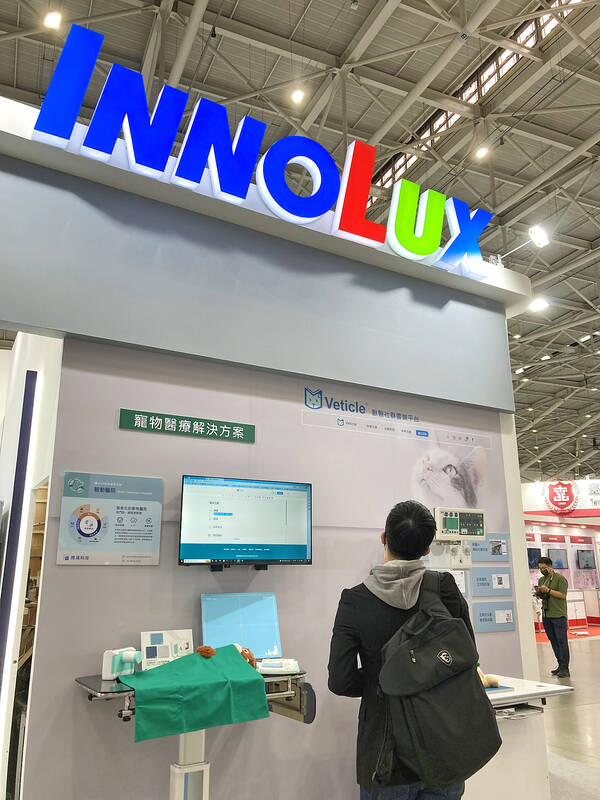Flat panel maker Innolux Corp (群創) yesterday posted a seventh straight unprofitable quarter as global central banks’ interest rate hikes and soaring inflation depressed consumer spending on electronics that led to a supply glut.
To improve the imbalance of supply and demand, Innolux and its global peers have lowered factory utilization last year, the Miaoli-based company said in a statement.
Innolux posted a NT$18.64 billion (US$591.4 million) loss for last year, an improvement from a loss of NT$27.99 billion in 2022. Gross margin swung back to positive territory at 1.5 percent from minus-3.1 percent the previous year.

Photo: Lisa Wang, Taipei Times
During the final quarter of last year, Innolux’s losses widened to NT$3.24 billion, from a loss of NT$1.9 billion in the third quarter as customer demand subsided following the end of year-end shopping season. The average selling price dropped about 3.5 percent sequentially to US$269 per square meter during the final quarter.
Innolux expects the flat panel industry to usher in a growth period this year, thanks to better economic prospects worldwide and new TV replacement demand due to three major sports events, including the Paris Olympics and UEFA Euro 2024.
New artificial intelligence (AI)-enabled devices such as smartphones and PCs are also to drive demand, the Miaoli-based company said in the statement.
Innolux is accelerating its transformation efforts to expand into advanced chip packaging, auto displays and other new businesses beyond flat panels, the statement added.
Shifting away from flat panels would play a crucial role in the company’s transformation as those new businesses would help shield against the boom-and-bust flat panel industry and help the company report stable earnings, Innolux said.
The company in December last year said that its new panel-level-packaging services would start contributing revenue in the second half of this year.
Non-display products made up 28 percent of the company’s total revenue last year, up from 24 percent in 2022.
As the industry enters its off-season, Innolux expects shipments of large flat panels for TVs and PCs to decline by a low single-digit percentage this quarter from the previous quarter.
Overall average selling prices would increase by low single-digit percentage sequentially this quarter, the company forecast.
Innolux plans to spend NT$21 billion on new equipment this year, little changed from NT$21.4 billion last year.

CHIP WAR: Tariffs on Taiwanese chips would prompt companies to move their factories, but not necessarily to the US, unleashing a ‘global cross-sector tariff war’ US President Donald Trump would “shoot himself in the foot” if he follows through on his recent pledge to impose higher tariffs on Taiwanese and other foreign semiconductors entering the US, analysts said. Trump’s plans to raise tariffs on chips manufactured in Taiwan to as high as 100 percent would backfire, macroeconomist Henry Wu (吳嘉隆) said. He would “shoot himself in the foot,” Wu said on Saturday, as such economic measures would lead Taiwanese chip suppliers to pass on additional costs to their US clients and consumers, and ultimately cause another wave of inflation. Trump has claimed that Taiwan took up to

A start-up in Mexico is trying to help get a handle on one coastal city’s plastic waste problem by converting it into gasoline, diesel and other fuels. With less than 10 percent of the world’s plastics being recycled, Petgas’ idea is that rather than letting discarded plastic become waste, it can become productive again as fuel. Petgas developed a machine in the port city of Boca del Rio that uses pyrolysis, a thermodynamic process that heats plastics in the absence of oxygen, breaking it down to produce gasoline, diesel, kerosene, paraffin and coke. Petgas chief technology officer Carlos Parraguirre Diaz said that in

SUPPORT: The government said it would help firms deal with supply disruptions, after Trump signed orders imposing tariffs of 25 percent on imports from Canada and Mexico The government pledged to help companies with operations in Mexico, such as iPhone assembler Hon Hai Precision Industry Co (鴻海精密), also known as Foxconn Technology Group (富士康科技集團), shift production lines and investment if needed to deal with higher US tariffs. The Ministry of Economic Affairs yesterday announced measures to help local firms cope with the US tariff increases on Canada, Mexico, China and other potential areas. The ministry said that it would establish an investment and trade service center in the US to help Taiwanese firms assess the investment environment in different US states, plan supply chain relocation strategies and

Japan intends to closely monitor the impact on its currency of US President Donald Trump’s new tariffs and is worried about the international fallout from the trade imposts, Japanese Minister of Finance Katsunobu Kato said. “We need to carefully see how the exchange rate and other factors will be affected and what form US monetary policy will take in the future,” Kato said yesterday in an interview with Fuji Television. Japan is very concerned about how the tariffs might impact the global economy, he added. Kato spoke as nations and firms brace for potential repercussions after Trump unleashed the first salvo of